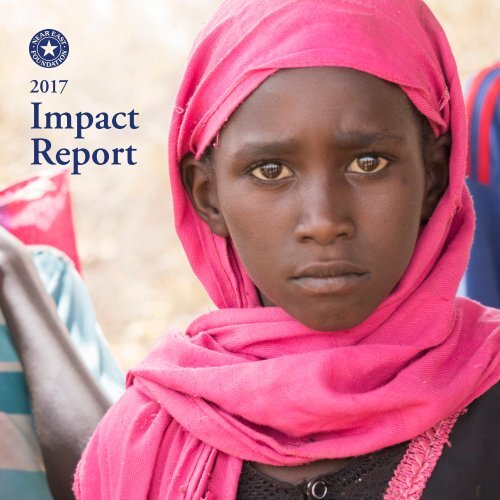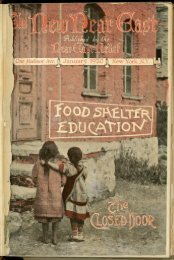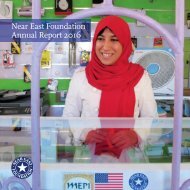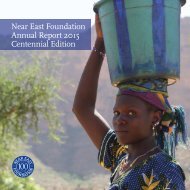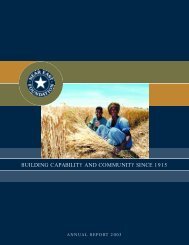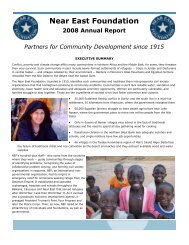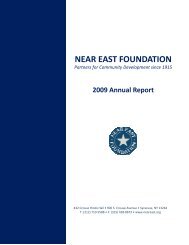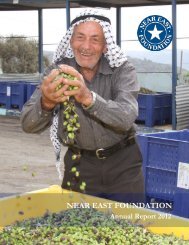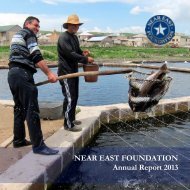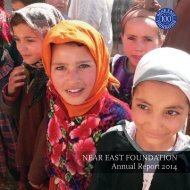2017 Impact Report
You also want an ePaper? Increase the reach of your titles
YUMPU automatically turns print PDFs into web optimized ePapers that Google loves.
<strong>2017</strong><br />
<strong>Impact</strong><br />
<strong>Report</strong>
Near East Foundation<br />
<strong>2017</strong> IMPACT REPORT<br />
01
With your support, NEF is building knowledge, strengthening voices,<br />
and creating economic opportunity for those who need it most.<br />
THANK YOU<br />
02
Letter from the President<br />
TO OUR SUPPORTERS:<br />
Last year, I had the opportunity to travel extensively<br />
to visit with people whose lives have been impacted by<br />
NEF. I listened to their unique dreams and ambitions for<br />
their futures, many of which have been derailed by war,<br />
oppression, climate extremes and other obstacles most of<br />
us cannot fathom. However, because of your support, we’ve<br />
been able to help them develop the skills and access the tools<br />
they need to improve their lives while preserving their dignity<br />
and most importantly, their hope.<br />
Recently, in Darfur’s Nuba Mountains, I was overwhelmed<br />
and uplifted to see firsthand the depth of need and the<br />
impact of NEF’s work in some of the most isolated, war-torn<br />
communities imaginable. Simple yet effective interventions<br />
such as new wells, pumps, water storage, and basic latrines<br />
are saving countless lives and improving the quality of life<br />
for so many. NEF’s work in Darfur which is made possible<br />
because of donors like you, exemplifies our ability to mobilize<br />
communities to address their most basic needs in the midst<br />
and in the wake of crisis.<br />
While encouraged by the progress we are making, I know<br />
that our work is far from done. In 2018, NEF will continue<br />
to help people develop skills and access resources to rebuild<br />
their lives. We cannot do it alone. To increase our ability to<br />
independently deliver responsive services in the changing<br />
landscape of humanitarian assistance, we have launched a<br />
Recovery and Resilience Fund. With your support we can<br />
create a long-term and flexible foundation to deliver lifesaving<br />
programs and life-affirming assistance. It is my hope<br />
that the impact demonstrated in this report once again<br />
proves NEF to be an effective and worthy partner for your<br />
own efforts to make a positive change in the world.<br />
With sincere gratitude,<br />
Charles Benjamin<br />
03
Near East Foundation<br />
The Near East Foundation helps<br />
build more sustainable, prosperous,<br />
and inclusive communities in the<br />
Middle East and Africa through<br />
education, community organizing,<br />
and economic development.<br />
WE WORK WHERE THE<br />
WORLD NEEDS US MOST<br />
• Armenia<br />
• Jordan<br />
• Lebanon<br />
• Mali<br />
• Morocco<br />
• Palestine<br />
• Senegal<br />
• Sudan<br />
• Syria<br />
04
NEF’s Recovery and Resilience Fund<br />
INVEST IN IMPACT<br />
Photo Credit: IED Afrique,<br />
Lancelot Soumelong Ehode<br />
Everyone deserves an opportunity to provide for their<br />
families and work toward a better future.<br />
NEF works at the local community level,<br />
providing opportunities for safe and dignified<br />
livelihoods, and access to life-sustaining natural<br />
resources.<br />
By establishing partnerships and trust<br />
within the communities we serve, NEF<br />
implements community-driven solutions<br />
through innovative programs that address the<br />
underlying causes of poverty.<br />
Please support and strengthen our ability<br />
to reach more people with our work<br />
by donating to NEF’s Recovery<br />
and Resilience Fund.<br />
Together, let’s make an<br />
impact.<br />
05
Our vision is to help people and communities move beyond survival by<br />
providing them with resources to achieve a better future. Here’s how:<br />
BUILDING ECONOMIC AND<br />
SOCIAL RESILIENCE THROUGH<br />
SUSTAINABLE LIVELIHOODS<br />
NEF promotes the economic<br />
independence and social resilience of<br />
vulnerable populations with a focus on<br />
women, refugees, and youth through<br />
entrepreneurship, microfinance, and<br />
peer networks that provide business<br />
mentoring and social support.<br />
IMPROVING FOOD SECURITY<br />
THROUGH NATURAL RESOURCE<br />
MANAGEMENT<br />
NEF supports smallholder farmers<br />
and other natural resource-dependent<br />
populations through initiatives<br />
that improve food security, increase<br />
income, and facilitate adaptation<br />
in order to develop local capacity<br />
and infrastructure that ensures<br />
communities have tools necessary<br />
to manage agricultural and natural<br />
resources sustainably in the long-term.<br />
PEACEBUILDING THROUGH<br />
ECONOMIC DEVELOPMENT<br />
NEF implements highly effective<br />
initiatives that help reduce poverty<br />
and promote sustainable economic<br />
development in conflict and<br />
post-conflict areas. Focusing on<br />
core livelihood issues, NEF helps<br />
populations find mutual interests and<br />
benefit through economic cooperation.<br />
06
Our <strong>Impact</strong><br />
In <strong>2017</strong>, NEF directly<br />
benefited the lives of over<br />
1,600,000 people<br />
<strong>2017</strong> IMPACTS<br />
682<br />
people participated in peacebuilding<br />
activities<br />
1,078<br />
youth participated in activities on life<br />
skills, financial saving, and positive<br />
coping strategies<br />
2,102<br />
businesses launched or expanded<br />
2,432<br />
people trained in financial<br />
literacy, business management,<br />
and vocational trades<br />
790,424<br />
people became more resilient to climate<br />
change<br />
1,081,509<br />
people have benefited from improved<br />
access to safe water<br />
07
Investing in Community Resilience<br />
In the unpredictable environment of the Sahel, Malian<br />
and Senegalese communities are facing increasingly critical<br />
challenges due to recurring climate extremes—including<br />
prolonged droughts and devastating flooding. The negative<br />
impacts on crops and livestock have left entire communities<br />
struggling to recover. In <strong>2017</strong>, NEF and its partners<br />
continued to increase food security and economic growth in<br />
the region through locally-led interventions. These include<br />
establishing cereal banks and water basins for grain and<br />
water storage, building wells, improving irrigation systems,<br />
planting water efficient crops, and teaching techniques for<br />
soil and water conservation. By linking communities most<br />
in need with locally-controlled investment funds, NEF is<br />
helping to embed inclusive planning and finance mechanisms<br />
into local and national government.<br />
“Our village has been here for 72 years, and we have<br />
always had to walk to access water. Now we have easy<br />
access to it right in our village.”<br />
Arama, Sama Village Chief<br />
08
Photo Credit: IED Afrique, Lancelot Soumelong Ehode<br />
VILLAGE OF SAMA, MALI<br />
Sama Village Chief, Garçon Arama, needed sustainable<br />
solutions to address the harsh conditions his people were<br />
facing due to the lack of an adequate water source in the<br />
village. To gather water needed for their crops, livestock,<br />
and homes, villagers —often women and children—had to<br />
embark on a long and dangerous journey daily to the nearest<br />
water source miles away. To make matters worse, the time<br />
spent gathering water was time spent away from tending to<br />
crops, gardens, and livestock —worsening the conditions and<br />
livelihoods of the people of Sama.<br />
To address the situation, NEF worked with the community<br />
to install a natural water collection basin with a filter<br />
system that flows into secondary basins for watering crops<br />
and livestock as well as to a public standpipe for drinking<br />
water. Because the whole community was committed to this<br />
investment, the peoople of Sama are now safer, healthier, and<br />
generating more food and income through gardening and<br />
healthy livestock.<br />
181,231<br />
people in Mali and Senegal are more food secure, thanks to your support.<br />
09
Restoring Livelihoods in Times of Crisis<br />
Over 13 million people are now displaced from their homes<br />
due to the ongoing war in Syria, including over 5 million<br />
displaced outside of Syria in neighboring countries. In <strong>2017</strong>,<br />
NEF responded to the growing needs of families who have<br />
been affected by this ongoing crisis in Jordan and Lebanon.<br />
For Syrian and Iraqi refugees, the struggle to gain their<br />
footing and rebuild their life begins the minute they enter<br />
their host country and continues for many years after. It is in<br />
this complex landscape that NEF is working to provide both<br />
vulnerable host community families and refugee families with<br />
safe and sustainable opportunities to adapt, recover, and earn<br />
an income in order to achieve economic stability.<br />
Over three-quarters of Syrian refugees in Lebanon now live on less than<br />
$4 per day, and nearly 90% of refugee households are in debt.<br />
10
IMAN, LEBANON<br />
Like so many Syrian families whose homes have been<br />
destroyed, Iman and her husband, Ahmed, were forced to<br />
leave their home in Syria and flee to Lebanon with their<br />
four children. Their fifth child, a beautiful little girl named<br />
Joumana, was born in the informal settlement where they<br />
now reside. It is the only life she has ever known.<br />
Iman and Ahmed found themselves in a country they did<br />
not know, reeling from the trauma of watching their home<br />
become a war zone, racking up debt, and relying solely on<br />
humanitarian assistance to care for their family. Neither<br />
could find work, Ahmed was badly injured due to enduring<br />
shrapnel in his leg from a bomb, and Iman had severe back<br />
problems that temporarily disabled her mobility.<br />
To help Iman and her family get back on their feet, NEF<br />
provided her with business development training and a<br />
small start-up grant to open a falafel stand, which she and<br />
her husband now run together. This small kiosk within the<br />
settlement community has become a hub for more than just<br />
food but also of friendship, laughter, and healing.<br />
Iman and Ahmed are now financially stable. Since starting<br />
their stand, they have paid down their debt and are working<br />
to save in order to expand their business. They are able to<br />
provide for their children who Iman says are, “smiling for the<br />
first time in a long time. They have hope.”<br />
1,878<br />
women in Lebanon and Jordan received business development training,<br />
thanks to your support.<br />
11
Building Brighter Futures<br />
NEF works with young people whose options are limited by<br />
lack of schooling, high unemployment rates, lack of credit,<br />
and in some cases refugee status. In Morocco, where young<br />
people account for 44 percent of the working age population,<br />
over half are out of school and out of work. Entrepreneurship<br />
is rarely encouraged, and risks are high for those that<br />
pursue their own businesses. The result is unemployed and<br />
disenfranchised youth who feel that the system has let them<br />
down. To address this, NEF has been working to foster a<br />
spirit of entrepreneurship among Moroccan youth, providing<br />
training, coaching, and mentoring, creating support<br />
networks, and awarding grants to youth with viable business<br />
plans.<br />
“The project has had a big impact on me, not just<br />
financially, but also on my family.”<br />
Jalal, Morocco<br />
12
JALAL, MOROCCO<br />
Only a few years ago, Jalal was a young man selling his art<br />
to tourists and making barely enough to get by. After getting<br />
married and the arrival of his first child, he knew that he had<br />
to make something more of his talents. He met with NEF’s<br />
Empowering Youth Through Entrepreneurship project staff<br />
and says, “That was the meeting that changed my life.”<br />
Like many young people in Morocco, Jalal did not know<br />
how to start his own business, especially in the nontraditional<br />
field of metal art sculpture. He had no money<br />
to invest and needed guidance on how to manage a small<br />
business. With training, coaching, connection to business<br />
networks, and a grant through NEF and its partners, Jalal<br />
now runs a successful shop where he produces and sells his<br />
art. He has been invited to display his work at regional and<br />
national exhibitions.<br />
For Jalal and many others, the opportunity to start a<br />
business and build a future is also cultivating young leaders<br />
in Morocco. Sharing that the project inspired him to<br />
become an activist for youth causes, Jalal now leads a local<br />
entrepreneurship association and is an active member of an<br />
equal opportunity advocacy organization.<br />
3,000<br />
youth have been reached by activities that support the spirit of<br />
entrepreneurship, thanks to your support.<br />
13
Turning Empowerment into Progress<br />
In dire times, women in rural Sudan are looked to as a<br />
source of hope and resilience, within the community.<br />
Despite this, their efforts to contribute financially are not<br />
prioritized or supported. This leaves them struggling to earn<br />
a steady income and to provide food for their families. While<br />
women make up the majority of those working in the nonwood<br />
forest product sector in Sudan, their lack of access,<br />
knowledge, and formal organization has meant they receive<br />
far less than the market price for their products. By providing<br />
training on new techniques for production and harvesting,<br />
NEF not only helps women increase their income but also<br />
avoid degradation of natural resources. Progress for women is<br />
leading to progress for entire communities, emphasizing the<br />
crucial role women play in local economies.<br />
In Sudan, women make up 72% of those involved with non-wood<br />
forest products but earn 80% less than men in the sector.<br />
14
FATIMA, SUDAN<br />
Fatima is the chairperson of her village’s women’s association.<br />
“I realized that the only economic resource exclusively under<br />
the control of women in the village was non-wood forest<br />
products,” says Fatima. These include gum arabic, desert<br />
dates, honey, sider, baobab, and other local fruits. She added,<br />
“I thought that, if the women of my village managed to<br />
unite, they could increase their income and gain respect from<br />
their husbands and other men.”<br />
NEF has helped Fatima and the women’s association upgrade<br />
their non-wood forest products through screening, sorting,<br />
improving storage and packing, and taking measures to<br />
prevent insect infestations. Along with formal packaging and<br />
branding, these measures have resulted in a higher price for<br />
their goods. By assisting the association to establish improved<br />
linkages with wholesalers, NEF has given them access to a<br />
wider market to sell their produce.<br />
“Today, every woman from the association says they derive<br />
substantial revenues from it,” explains Fatima. She has also<br />
seen attitudes and behaviors related to deforestation change.<br />
Moreover, the men in her village support the association by<br />
providing additional areas for planting. The village chief has<br />
said, “The future of the community is now in the hands of<br />
the women.”<br />
5,573<br />
people have benefited from the activities of 13 women’s associations<br />
established, thanks to your support.<br />
15
Building Peace Through Partnerships<br />
Conflict is a significant cause of poverty in many of the<br />
communities where NEF works. Whether it is active warfare<br />
or competition over resources and land, the consequences<br />
can be devastating and recovery can take years. From Sudan<br />
to Palestine, where conflict can flare up at a moments notice,<br />
NEF continues to promote dialogue and reconciliation<br />
among groups in conflict by presenting opportunities for<br />
shared economic benefit.<br />
To establish an environment that promotes peace, NEF<br />
identifies opportunities for interaction between opposing<br />
groups that focus on common concerns and mutual benefits.<br />
NEF facilitates this type of grassroots economic cooperation<br />
through value chain development, collaborative natural<br />
resource management, and economic reintegration of<br />
internally displaced people.<br />
“I saw this as a real opportunity to make my dream<br />
come true.”<br />
Sulaiman, Palestine<br />
16
SULAIMAN, WEST BANK<br />
Sulaiman, a Palestinian husband and father, worked for years<br />
on various farms in the Jordan Valley where he was raised. “I<br />
didn’t have access to the knowledge or resources to do what<br />
I actually wanted to do when I finished school,” he says. His<br />
dream was to create and run his own agribusiness.<br />
In the West Bank, NEF works with young Palestinian and<br />
Israeli women and men to start joint cross-border agricultural<br />
businesses. The aim is to provide opportunities for market<br />
expansion, knowledge sharing, and ultimately, mutual<br />
understanding between the two groups.<br />
“I saw this as a real opportunity to make my dream come<br />
true,” says Sulaiman. Despite skepticism from friends and<br />
family, he decided to participate in NEF’s cross-border<br />
business development training inside Israel.<br />
There, he met a young Israeli farmer named Walid who<br />
also wanted to launch his own agribusiness. Sulaiman and<br />
Walid joined forces to invest in a date processing plant in the<br />
West Bank with plans to access markets in both Israel and<br />
Palestine. By the end of the first training, Sulaiman felt he<br />
had benefited greatly saying, “I learned what I needed to start<br />
my business.”<br />
Together, Sulaiman and Walid submitted a business plan,<br />
which was approved and selected to receive a start-up grant.<br />
They used the grant to build a drying facility, a warehouse,<br />
and to purchase equipment. When Sulaiman’s friends and<br />
family come to visit the business, he describes the pride he<br />
feels, saying, “they can’t hide their admiration for what we<br />
have built together.”<br />
30<br />
cross-border businesses have launched, thanks to your support.<br />
17
A Trusted Vehicle for your<br />
Philanthropy for over 100 Years<br />
COST EFFECTIVE PROGRAMS<br />
NEF delivers high impact programs while keeping our overhead costs low, making<br />
the most of your donation.<br />
In <strong>2017</strong>, 94% of our<br />
resources went directly to<br />
NEF programs to improve<br />
the lives of those who need<br />
our help most.<br />
CHARITY NAVIGATOR<br />
NEF’s commitment to accountability<br />
and transparency has earned it a<br />
4-star rating from Charity Navigator,<br />
America’s largest independent charity<br />
evaluator.<br />
GLOBAL GIVING<br />
In <strong>2017</strong>, NEF was recognized as a<br />
vetted member of the GlobalGiving<br />
community for being a trusted partner<br />
and change-maker in the world.<br />
BETTER BUSINESS BUREAU<br />
NEF is an accredited member of<br />
the Better Business Bureau meeting<br />
the highest standards for ethics and<br />
accountability to ensure confident<br />
charitable giving.<br />
What if you had the<br />
power to change a life?<br />
Ending poverty starts with an opportunity.<br />
Donate to NEF today.<br />
neareast.org<br />
18
Financial Summary<br />
FINANCIAL REPORT—FISCAL YEAR <strong>2017</strong> (July 2016 - June <strong>2017</strong>)<br />
Statement of Financial Position at June 30, <strong>2017</strong><br />
ASSETS<br />
Cash and Equivalents 2,641,258<br />
Grants and Contracts Receivable 541,675<br />
Accounts and Loans Receivable 1,434,511<br />
Investments (at fair value) 5,480,311<br />
Prepaid Expenses 52,796<br />
Property and Equipment (net) 139,497<br />
Total $10,290,048<br />
Statement of Activities Year ended June 30, <strong>2017</strong><br />
REVENUES AND OTHER SUPPORT<br />
Contributions 857,068<br />
Government 12,994,961<br />
Private Grants 226,171<br />
In Kind Contributions 201,260<br />
Investment Income 516,882<br />
Other Income 404,975<br />
Total $15,201,317<br />
LIABILITIES AND NET ASSETS<br />
Accounts Payable &<br />
925,334<br />
Accrued Expenses<br />
Deferred Revenue 3,260,000<br />
Total Net Assets $4,185,334<br />
Unrestricted 2,455,140<br />
EXPENSES<br />
Program Services 13,921,393<br />
Management and General 719,275<br />
Fundraising 147,752<br />
Non Operating Expenses 231,793<br />
$15,020,213<br />
Temporarily Restricted 37,785<br />
Permanently Restricted 3,611,789<br />
Net Surplus/(Deficit) $181,104<br />
Total Net Assets $6,104,714<br />
Total $10,290,048<br />
19
NEF Board of Directors<br />
U.S. BOARD OF DIRECTORS<br />
Robert J. Solomon, Chairman<br />
Johnson Garrett, Vice Chairman<br />
Haig Mardikian, Secretary<br />
Charles Bird, Treasurer<br />
Charles Benjamin, Ph.D., President<br />
Carol B. Aslanian<br />
Nina Bogosian Quigley<br />
Mehrzad Boroujerdi, Ph.D.<br />
Randa El-Sayed Haffar<br />
Mona Eraiba<br />
Alexander S. Ghiso<br />
Jeff Habib<br />
Yezan Haddadin<br />
Linda K. Jacobs, Ph.D.<br />
Shant Mardirossian<br />
Amr Nosseir<br />
Matthew Quigley<br />
William Sullivan<br />
U.K. BOARD OF DIRECTORS<br />
Anthony R. Williams, Chairman<br />
Anthony G. Williams<br />
Robert Brown<br />
Linda K. Jacobs, Ph.D.<br />
Johnson Garrett<br />
ACADEMIC COUNCIL<br />
John Kerr, Ph.D.<br />
John McPeak, Ph.D.<br />
Thomas Mullins<br />
Juliet Sorensen, J.D.<br />
Michaela Walsh<br />
HONORARY BOARD<br />
Shahnaz Batmanghelidj<br />
Amir Farman-Farma<br />
John Goelet<br />
John Grammer<br />
Ronald Miller<br />
David Mize<br />
Richard Robarts (in memoriam)<br />
Anthony Williams<br />
Tarek Younes<br />
PRESIDENT’S COUNCIL<br />
H.E. Andre Azoulay<br />
Ian Bremmer<br />
Ambassador Edward P. Djerejian<br />
Vartan Gregorian, Ph.D.<br />
Ambassador Richard W. Murphy<br />
Her Majesty Queen Noor of Jordan<br />
James B. Steinberg<br />
Ambassador Frank G. Wisner<br />
20
Institutional Funders<br />
Big Lottery Fund<br />
Bogosian Quigley Foundation<br />
CARE International Maroc<br />
Cherie Blair Foundation for Women<br />
City and Guilds Group<br />
Comic Relief UK<br />
Cleveland H. Dodge Foundation<br />
European Union<br />
Global Giving<br />
Partners<br />
Al-Farooq Charitable Society for Orphans<br />
al Hadatha Association<br />
Al Qadesyeh Female Youth Center<br />
alAmana Microfinance<br />
Arcenciel<br />
AMAPPE<br />
Association d’Appui de Developpement Intégré<br />
Buisra Youth Center<br />
Ein Al-Bida Female Youth Center<br />
Galilee International Management Institute<br />
Gegharkunik Chamber of Commerce/Industry<br />
Kingdom of the Netherlands<br />
MEDAIR<br />
Oak Foundation<br />
RAIN Foundation<br />
Rangoonwala Foundation<br />
Trafigura Foundation<br />
U.K. Department of International<br />
Development<br />
U.N. Development Program<br />
Gharandal Youth Center<br />
Halima Association for Women<br />
Hand in Hand for Development and Peace, Sudan<br />
Innovations Environnement Developpment Afrique<br />
International Institute for Environment and Dev.<br />
Jordanian Ministry for Youth<br />
Jordanian National Forum for Women<br />
Majales El Kheir for Peace and Development<br />
Org. for Voluntary Humanitarian Assistance Program<br />
Palestinian Center for Agriculture Research and Dev.<br />
Peres Center for Peace<br />
U.S. Agency for International<br />
Development (USAID)<br />
USAID Office of Food for Peace<br />
USAID Office of Foreign<br />
Disaster Assistance<br />
U.S. Department of State Bureau of<br />
Population, Refugees, and Migration<br />
U.S. Middle East Partnership Initiative<br />
World Bank<br />
Qawafel Al Khair<br />
Réseau Marocain de l’Economie Sociale et Solidaire<br />
Sahab Society for Social Development<br />
Sudanese Organization for Humanitarian Aid<br />
Sudanese Red Crescent Society<br />
Syracuse University<br />
Tafila Female Youth Center<br />
Tichka Association<br />
Women’s Support Centre (Armenia)<br />
Working Women Society<br />
Youth Society for Self-Development<br />
Thank you to the community of generous donors that allow NEF to<br />
make our mark on the world.<br />
This year we received gifts from nearly 400 foundations and people from all walks of life, a wide array<br />
of ethnic and religious backgrounds, and far-reachng geographies. We are grateful for each and every<br />
donation received, and hope that you will continue to support NEF long into the future.<br />
To see the complete list of donors for the July 1, 2016–June 30, <strong>2017</strong> fiscal year, please go to:<br />
www.neareast.org/<strong>2017</strong>-impact-report<br />
21
A special thank you to<br />
Syracuse University for<br />
enabling NEF to draw<br />
upon the talent and<br />
creative energy of the<br />
academic community<br />
to help address critical<br />
challenges while training a<br />
new generation of leaders<br />
who will guide the future<br />
of social and economic<br />
development worldwide.<br />
@NearEastFdn<br />
Near East Foundation<br />
@neareastfoundation<br />
US HEADQUARTERS<br />
110 West Fayette Street, Suite 710<br />
Syracuse, NY 13202<br />
United States<br />
UK HEADQUARTERS<br />
32-36 Loman Street<br />
London SE1 0EH<br />
United Kingdom<br />
CONTACT<br />
info@neareast.org<br />
www.neareast.org


